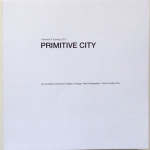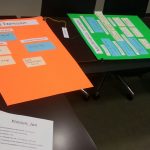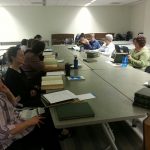[Agricultural Adjustment Administration documents related to Kentucky] (OCLC #891104587)
(Cataloging flash mob!)
For this month’s Third Thursday (cataloging discussion and professional development), we did a “bring your cataloging problems” session. I brought one that had been lurking on a nearby shelf in cataloging for years.
Those 39 volumes were not actually books; they were a bound archival collection (of letters, forms, and other documents related to the Agricultural Adjustment Administration in Kentucky) but our Archives/Special Collections did not want them in their collections. Though the volumes contained some federal government documents, they also contained many state government documents (all mixed together!) so they did not belong in our federal documents collection either.
There were so many decisions to make: Should they be disbound, and the pieces cataloged separately and sorted into their appropriate locations? Should they get a detailed finding aid, or a briefer collection record? Should we gather more opinions from staff who might remember more about the collection, or change their opinion about which branch it should live in?
One thing that was clear was that the books were getting no use sitting on my shelf, and with all of my analysis paralysis going on, that’s where they were going to stay unless I got some help. At the problem session, I passed out volumes and a skeletal record to the group, and told them my basic plan: keep the volumes bound, collection record only, shelve in main library. Together we examined the materials and muscled through the record, discussing each questionable field until we had consensus, and adding more subject access points to make it more discoverable by researchers in the field. It took about 40 minutes – now that shelf is clear!
If there is interest, someone may eventually re-visit this collection and give it a more thorough description, but for now, its discoverability has been significantly improved.


